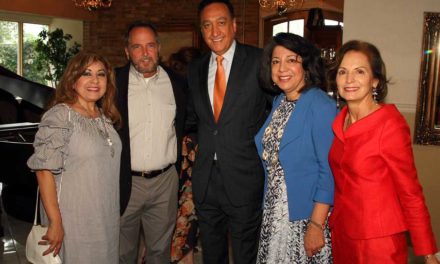Family history is an important part of your medical background; having family members with diabetes or high blood pressure will alert your doctor to the possibility that you may develop the same illness, even at a young age. Your family’s cancer history is especially important nowadays, because genetic testing for certain cancers is becoming more commonplace. Cancer history changes over time, as well, so it’s important to keep up with who’s been diagnosed with what in your family. It’s not being nosy but just being informed.
Many people will equate genetic testing with a famous recent story. When Angelina Jolie had her double mastectomy a few years ago, she did the medical community a favor by highlighting the link between breast cancer and a genetic change that she had inherited from her mom. She found out she had “the breast cancer gene”, also known as a BRCA mutation. What many people didn’t realize is that a couple of years later, she also had her ovaries removed because of the same mutation. Her mom had died of ovarian cancer at a relatively young age, in her 50s, and she had several family members who died of ovarian and breast cancer. When she found out she carried a genetic mutation, she was told she had up to an 87% chance of developing breast cancer, and up to a 50% chance of developing ovarian cancer. She chose surgery because it lowered her risk the most.
Many patient forget about other cancers that can have a genetic link, like colon cancer, uterine cancer, pancreatic or prostate cancer, even melanoma, the vicious skin cancer. Because most cancers are more common as we age, having one relative diagnosed with colon cancer, say at the age of 85, is not going to make you higher risk. However, if you have 3 or 4 relatives with colon cancer, and one of them was diagnosed before the age of 50, well that’s a different story. On the other hand, uterus or ovarian cancer is rare enough in the general population that even one affected relative once removed (like an aunt or grandmother) is enough to qualify for genetic testing, according to the National Comprehensive Cancer Network.
So talk to relatives and be nosy. Find out who had cancer, what kind, and how old they were when they were diagnosed. Update your doctor yearly on your family’s cancer history. You may find out that you qualify for genetic testing and if you find out you have one of several cancer genes, you will have the unique opportunity to change your genetic destiny and even prevent cancer. Check out the quiz below: and if you need to talk to a professional about your family history, consider contacting a genetic counselor at the Baptist Breast Center, or call my office at 210-504-5053
Are you of Ashkenazi Jewish heritage?
Have you ever been diagnosed with breast, ovarian, colon, uterus, pancreatic, gastric, or prostate cancer or melanoma?
Has anyone in your family been diagnosed with any of the above cancer? Younger than the age of 50?
Are two or more of these relatives on the same side of the family?
If you answered yes to any of the above questions, please consider contacting me at 210-504-5053 or a genetic counselor at the Baptist Breast Cancer or at UTHSCSA.
Do You Know Your Family History?










